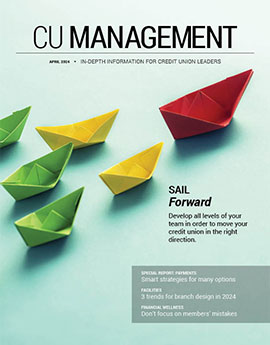6 minutes
Board members and CEOs frequently ask us: “Do we really need to focus on governance?” Before answering, we ask: “What’s behind your question?”
The most common response we receive is, “If it ain’t broke, why fix it?” That is, many assume their governance is effective largely because the credit union’s “numbers are good.”
When we suggest “just because a credit union is performing well financially, it doesn’t necessarily mean the credit union is being governed effectively,” we get a lot of blank stares. Our perspective comes as a surprise to some. If the credit union is “doing well” and the board is responsible for the credit union, then doesn’t that mean the board is doing its job effectively?
In a word…no. Without a much deeper analysis, simply equating “good credit union performance” with “good board performance” or general “good governance” is leaping to an unwarranted conclusion.
Of course, to many board members, it feels perfectly natural to make the leap. That’s because it is a result of how we, as humans, are designed to work. In some situations, making a quick analysis is perfectly appropriate. In others, it can lead to flawed decisions.
So, why is the “natural conclusion” unwarranted here? Well…it could be the credit union is blessed with a great CEO and management team who are doing a terrific job – dare we say it? – despite the board! Or, it may be the credit union is fortunate enough to be benefiting from a strong economy. Or, it could be there is a long lag effect and decisions made five years ago are what improved performance. And, yes – it could be the board’s leadership is actually contributing to the credit union’s performance. It’s just that “good governance” is too complex a conclusion to simply reach from “good financial results.”
So why do we do it anyway? We instinctively try to create some type of order out of our environment and our experiences by finding meaningful patterns and connections in acts, decisions, and the results that flow from them. We do this because we are designed to do so. Only by being more conscious of (1) how our own minds work, (2) being more aware of what connections we are consciously or unconsciously making, and (3) determining what facts are truly related and relevant to the issue at hand, can we avoid some of the thinking traps. Below are just a few of the tricks our brains regularly play on us while we are trying to “make sense” of our world. They are so subtle and so ingrained we are frequently not even aware of them. By calling them out, by asking each other the hard questions that must be asked at the fiduciary, strategic and generative levels, credit union leaders can together minimize the impact of the tricks our brains can play on us and, thereby, make better decisions.
Seeing connections that may not be there. We can all take a little bit of information and build a story linking the bits of information into a simple explanation for what may be a very complex reality. But we don’t always have enough facts, and sometimes we aren’t even asking ourselves the right questions. Is good financial performance the same as good governance? How is the board directly contributing to the credit union’s success? Even if we can’t answer the questions, maybe by being aware the answers shouldn’t be based on an assumption can lead to better discussions, better decisions and a better understanding of what the board is actually contributing to the success of the credit union.
Personal bias. We all filter facts through our own experiences so we better understand them. When others perceive our thoughts as open and relevant, we may be viewed by others as wise, aware or even empathetic. When our minds are already made up, when we don’t listen, many view our thinking in terms of a “personal bias.” We need to do all we reasonably can to be aware of our own biases and assumptions and try to be genuinely open about seeing the world differently.
The halo effect. Our overall impression of something influences our feeling and thoughts about it, and it can work for you or against you. Take the city of Las Vegas, for example. People tend to either love it or hate it. The halo effect goes beyond a personal bias because you can have an opinion about Las Vegas without ever having been there. This effect can be so strong it can outweigh the facts, especially if they don’t agree with strong feelings or assumptions.
Anchoring. We tie thoughts and feelings to a piece of information and then apply it to another piece of information, even if the two things do not have anything in common. We tend to apply specific facts to general circumstances. That first piece of information becomes the “anchor” around which we perform our analysis. Consider a credit union board that bases its discussions on “how we used to do it,” and uses that filter to make decisions for the present day. The analysis is “anchored” to a prior experience that may have little or no relation to the needs of present-day members.
The endowment effect. It’s likely you’ve done this one, too. Have you ever assigned more value to your own abilities than others’ abilities? We all tend to think we are better than average. Study after study notes anywhere from 65 percent to 85 percent of people think they are “better than average.” Confidence can be a good thing, but that many people can’t be better than average, it is mathematically impossible. Boards—yes, even your board—may unconsciously assign more value to its efforts than the impact warranted. Your board may be one of the majority of credit union boards that would rate itself as “better than average.”
Loss aversion. Credit union boards are notoriously risk adverse. Many strongly prefer avoiding loss to the risk of acquiring gains – or even serving members in better ways! Our focus on avoiding future loss can cause us to overestimate how truly risky some actions are. Being prudent is a good thing, but being extremely conservative can be the riskiest approach of all!
These are six examples of how we typically think. This instinctive thinking is one of the things that makes us human, and it is embedded deep within us. But when thoughtful analysis is required, we may get led astray by our instincts. We suggest being aware of the reasons underlying your judgments and actions can help you and your colleagues make better decisions about what you do and how you do it for your credit union, your members and the communities you serve.
Michael Daigneault, CCD, is CEO of Quantum Governance L3C, a CUES strategic provider of governance and board assessment services in Vienna, Va. Daigneault has more than 30 years of experience in the field of governance, management, strategy, planning and facilitation. Caitlin Curran Hatch is senior consultant for Quantum Governance, supporting the firm’s clients with more than 25 years of experience in the business and legal sectors. The organization fields more engagements in the credit union community than in any other, a total of 40 percent of its work.











